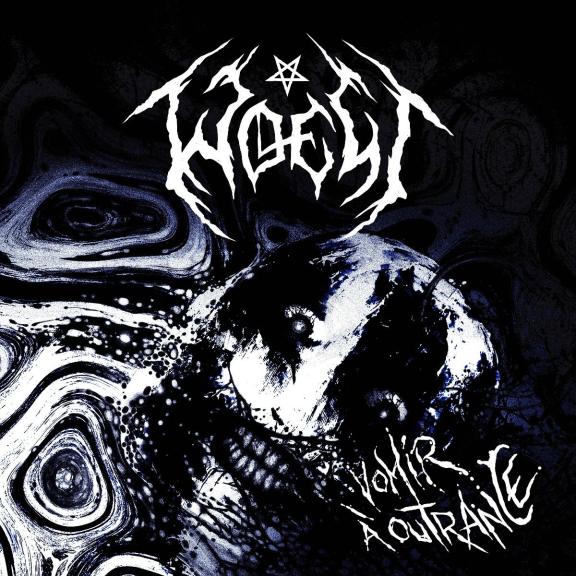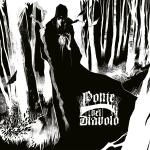Depending on the language and era, the word woest refers to savagery, ferocity, and waste... Who knows if the connection is intentional, but there is a hint of this idea in Woest's music. Almost seven years separate Vomir à Outrance ('vomit excessively') from its predecessor, Le Gouffre. As the origin story of this new misdeed, we can have fun imagining the multi-headed beast that is Woest, at the time, encountering its hideous reflection in the mirror and smashing it to pieces in a fit of rage. Bang, seven years of misery for everyone! The result is an album presented as “a revealing account inspired by a period of life, where setbacks and existential emptiness shatter the meaning of things”. The "Woest" is yet to come!
Just in case reading this pitch makes you fear something introspective, navel-gazing, and a bit boring, rest assured: Woest may end the same way, but it's not Alcest. The album's name was a clue, mind you, but just look at this tracklist: Sous-Sol ('basement'), L'Humiliation dans le Sang ('humiliation in blood'), Déterminé à Puer la Merde ('determined to skink like shit'), etc. Yeah, it's definitely not Alcest! The tone is set right from the strident dissonance of the intro, which is titled Intro because we're not the pompous type at Woest and we don't give a damn about your desire for pretty titles, two minutes of harsh noise hallucinations from which a few screams emerge. Delirium tremens, anxiety attack, sobbing, maniacal laughter? We're not sure, probably all of the above.
Woest is an ogre, the kind covered in putrid scabs, whose yellow teeth are turning brown and whose feet smell terrible. A grotesque, deformed monster, the band throws us a filthy, angry, desperate, grimacing black metal sound. The electronics add to the alienating gloom, whether with their icy layers or frenetic techno beats. The lyrics are in French, and they taste like drinking straight from the gutter. Punk energy sets the powder keg alight (Brûler, a snarling, nihilistic, apocalyptic assault). It's unhealthy, raw, uncompromising... and it hits hard. Woest has become more effective since Le Gouffre. Theatricality has given way to visceral punk rage. Sous-Sol is a steamroller covered in infected broken bottles, to which clear, liturgical vocals lend a mystical touch. The poetry of bloated bodies in the sewers.
Whether they like it or not, three unexpected things emerge from this disgusting stuff. The evocations of bodies, entrails, and other organic delights, like a body horror film, give the album a kind of visceral mystical fascination, with physical decay serving as an illustration of psychological collapse. This rejection of elegance, this constant choice of rotten, stinking, and dirty elements spread out over more than fifty minutes, naturally make Vomir à Outrance an album that leaves you bruised. But in France, we like to gorge ourselves on stinky stuff, and paradoxically, it's not forbidden to find a kind of poetry in it. In fact, the clue is given as early as Dionysiaque, when suddenly the chaos and heavy scansion give way to an atmospheric hallucination accompanied by an excerpt from Lautréamont's Chants de Maldoror. The refinement of bodily ruin, the beauty of ugliness, something both intimate, since it concerns the body, and demonic, evil, and mystical. They talk about poop and vomit, but they do so with sophistication.
So waddle in front of this monument of darkness and filth, as your behinds will demand with the intro to the title track, Vomir à Outrance. Vomit, vomit, vomit, a guttural voice hammers into us. Get ready to puke everywhere, both because it's dirty and cool to make a mess, but also because it feels good to get rid of all that stinking stuff from inside. In its abandonment and constant descent, the album finds grace, that of the fallen, the lost, the lame, the one-eyed, the mad. Each track becomes an anthem for those who have been vomited out by the world and are giving it back in kind.
In its final moments, Vomir à Outrance finally reveals its face in all its repulsive splendor: on Ôde à la Pluie, Woest lets melancholy replace outrageous provocations. The words recited are those of Yvan Francis Le Louarn, known as Chaval, a cartoonist and author with a scathing pen and fierce black humor. When the man committed suicide by turning on the gas in 1968, he left a note on his door: “Warning, Danger of Explosion.” That says it all. Depression, despair, death, abandonment, self-destruction, visceral pain, but all wrapped up in a form of humor. What if these excesses, this sense of farce, and all the times Woest sticks our faces in the toilet were ultimately just there to make enough noise and, out of modesty, distract us from the raw sensitivity we sense? No doubt about it. Caution, danger of explosion.





